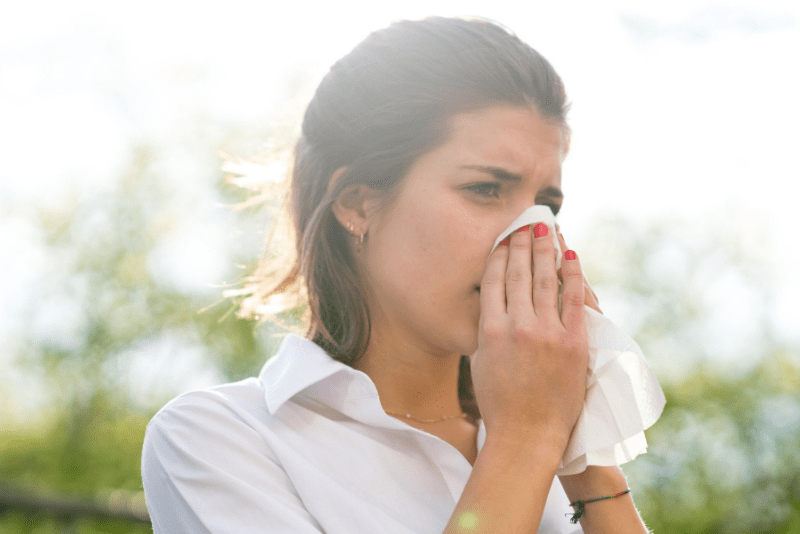[vc_row][vc_column][vc_column_text]Hives (or urticaria) are often described as red, raised, itchy bumps or “welts” that move around and can occur anywhere on the body. Typically, individual bumps do not last for long periods of time, and once they go away, they usually leave behind normal skin with no bruising or scarring.
[/vc_column_text][vc_column_text]Hives can be caused by multiple things. Although we usually assume that hives mean we are allergic to a food or medication, this is not always the case. In fact, most often people experience hives for no reason at all which can be very frustrating for the patient. Some patients experience this on and off for months or even years at a time. This type of hives is known as chronic idiopathic urticaria. This type of urticaria is not caused by any sort of food, medication, soap, lotion/cream, or environmental exposure. However, some patients do notice specific triggers that can make their hives worse or cause a flare. [/vc_column_text][vc_column_text]Common triggers for urticaria include hot showers, heat, pressure, tight clothing, stress/anxiety, illnesses, menstrual cycles, and drugs within the NSAID class (non-steroidal anti-inflammatory medications such as ibuprofen). About 40% of these patients also experience swelling (or angioedema) in association with their hives. Fortunately, this swelling is usually not life-threatening and does not cause the throat or airway to close. There are various treatments that can be started for chronic urticaria, including high dose daily antihistamines, a monoclonal antibody called Xolair (omalizumab), or immunosuppressant medications.[/vc_column_text][vc_column_text]Another form of hives is known as acute urticaria. This type of hives occurs for much shorter periods of time (less than 6 weeks) and can be caused by an allergic reaction to a food, medication, insect sting, or a viral illness. When hives occur almost immediately after ingesting a food (usually a new food), medication or being stung/bitten by an insect, this can be due to an allergic reaction. Allergic reactions typically progress further, and patients also develop swelling (angioedema), difficulty breathing, throat closing, profuse vomiting or diarrhea, and passing out. These symptoms are life-threatening and require emergent medical attention. Epinephrine is the life-saving treatment for severe allergic reactions like this, or anaphylaxis. [/vc_column_text][vc_column_text]Acute urticaria can also be due to a viral illness or the “common cold.” In fact, this is the most common cause of hives in children. Acute urticaria can be associated with angioedema (just like chronic urticaria discussed above), but this is generally not a life-threatening type of swelling. If hives occur within 1-2 weeks of viral symptoms (cough, cold, congestion, fever, vomiting, diarrhea), this is the likely cause of the hives. Again, this viral-induced acute urticaria can last for days up to 6 weeks. Antihistamines are usually effective for this type of hives, but once patients reach or surpass the 6-week mark, other medications can be added for chronic urticaria, as above.[/vc_column_text][vc_column_text]If you are allergic to dogs or cats and suffer from nasal congestion, runny nose, sneezing, and itchy eyes, you may also experience acute hives when you are in contact with these pets. This can occur when the pet rubs against you or licks your skin. However, these hives are usually very localized and restricted to the specific areas of skin with which the pets come in contact. [/vc_column_text][vc_raw_html]JTNDaWZyYW1lJTIwY2xhc3MlM0QlMjdzcHJvdXR2aWRlby1wbGF5ZXIlMjclMjBzcmMlM0QlMjdodHRwcyUzQSUyRiUyRnZpZGVvcy5zcHJvdXR2aWRlby5jb20lMkZlbWJlZCUyRjE4OWZkZWIxMWIxOGU0YzU5MCUyRmM1Zjc1NDg5NDA5MGQ3OWUlM0ZwbGF5ZXJUaGVtZSUzRGRhcmslMjZhbXAlM0JwbGF5ZXJDb2xvciUzRDY3Y2FlMCUyNyUyMHdpZHRoJTNEJTI3NjMwJTI3JTIwaGVpZ2h0JTNEJTI3MzU0JTI3JTIwZnJhbWVib3JkZXIlM0QlMjcwJTI3JTIwYWxsb3dmdWxsc2NyZWVuJTNFJTNDJTJGaWZyYW1lJTNF[/vc_raw_html][vc_column_text]If you’re unsure what is causing your hives and would like answers to your skin allergy issues, please reach out to us at 843-881-2030 or contact us here. [/vc_column_text][/vc_column][/vc_row][vc_row][vc_column][/vc_column][/vc_row]

What is causing hives?
- allergy
- charleston-allergy
- food-allergy
- indoor-allergy
- insect-allergy
- pet-allergy



